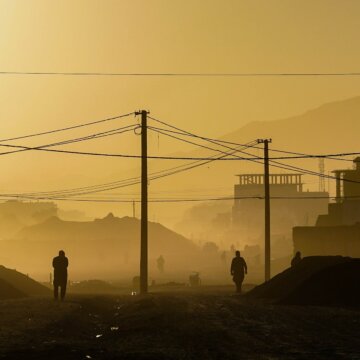- About
- Topics
- Picks
- Audio
- Story
- In-Depth
- Opinion
- News
- Donate
-
Signup for our newsletterOur Editors' Best Picks.Send
Read, Debate: Engage.
| topic: | Climate action |
|---|---|
| located: | Afghanistan, USA, China |
| editor: | Shadi Khan Saif |
Before the fall of Kabul, Afghanistan was actively searching for funds to support projects working to minimise the devastating impacts of climate change and global warming as one of the crises' frontline victims. Now, it is suffering silently.
With the state structure paralysed by the Taliban takeover and the subsequent international isolation, the vicious cycle of long droughts followed by devastating and erratic rains wreaked havoc this month in many parts of the country. Many lives were lost - mostly of women and children - in Maidan Wardak, Faryab and a number of other provinces as floods grew increasingly common.
Arguably, Afghans are facing the worst form of persecution due to the misplaced priorities of world powers such as the US and China, as well as all other nations responsible for the environmental degredation socio-political catastrophes we are witnessing. These rich and powerful countries are now behaving as so-called saviours, boasting about pledges of cash and food aid which in reality are not extended with genuine generosity.
The US's stubborn freezing of billions in Afghanistan's state assets on the one hand and China's quest to extract the war-ravaged country's mineral wealth on the other hand speak volumes about the superpowers' true agendas.
Some of the world's leading institutions, such as the World Bank have acknowledged that Afghanistan is "one of the most vulnerable nations to climate change impacts in the world". I was told by the former officials at the Afghanistan’s National Environmental Protection Agency that temperatures rose by 1.8°C between 1950 and 2010 here, twice the global average.
Various factors contribute to Afghanistan's outstanding vulnerability to the climate crisis, including its geography, sensitivity to changing weather patterns and an infrastructure unable to cope with global warming. This is despite the fact that Afghanistan's share in the global CO2 emission is below 0.03 percent.
The spells of untimely rains and subsequent floods, mass deforestation, melting glaciers and four decades of war have prompted many in rural areas to move to urban centers or neighbouring countries in order to save their lives.
Afghanistan faces "one of the world's most acute internal displacement crises" due to conflict and recurring disasters, according to the Geneva-based Internal Displacement Monitoring Center (IDMC). More than 4.6 million people - 1.2 million due to natural disasters - were internally displaced at the end of 2020, IDMC data showed.
Citizens of the world, particularly those living in the biggest environmental polluting countries, must hold their leaders accountable for causing the suffering in Afghanistan, which ultimately reaches their doorsteps as well in the form of migrants and even westophobic extremism.
The world's bright minds that are sensitive to the human sufferings linked to environmental degradation shall become the voice of the voiceless Afghans, and strive for change and justice.
I am saying this because the Afghan people and their state institutions at the moment are not in a position to make this case, as the latter still battles for recognition almost eight months since the fall of the west-back government in Kabul.
This Earth Day, we all need to make up for the tragedies inflicted on the Afghan people due to the environmental hazards triggered by the rich nations' greed. We must make climate justice part of our approach to tackling the Afghan crisis.
Image by Mohammad Rahmani.

